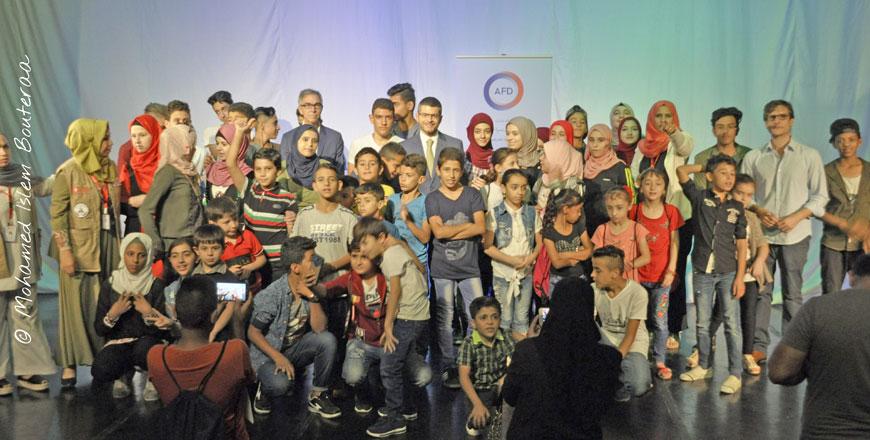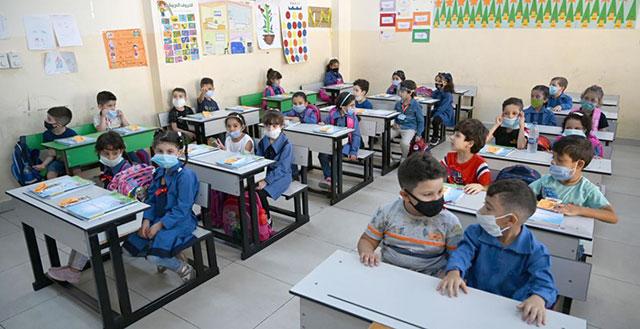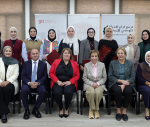You are here
Young dropouts regain place in school through informal education
By Camille Dupire - Sep 09,2018 - Last updated at Sep 09,2018

Young graduates pose for a photo with French Ambassador to Jordan David Bertolotti in Amman on Saturday (Photo courtesy of French embassy)
AMMAN — Since he dropped out of school a few years ago, Osama said he still regrets every single day out of the educational system. “I wish I didn’t ever leave. Especially when you see your friends are preparing to go to college. So I keep reading books to be ready to go back to school after this Informal Education class,” the young student explained, full of hope.
Osama (names were changed for anonymity purposes) was one of the 53 grinning graduates standing on stage on Saturday, as part of the graduation ceremony of the Premiere Urgence Internationale (PUI)’s Informal Education (IE) project’s second phase.
Part of a project financed by the French Agency for Development, the IE component aims at supporting young children who dropped out of school for less than three years, and accompany them on their way back to education, according to PUI head of mission Martin Rosselot.
To ensure a comprehensive support of the children and their parents, the programme includes a variety of aspects, ranging from IE classes based on the Makani curriculum (Arabic, English, math and sciences), weekly recreational activities, parents meeting to ensure the full investment of students’ families and collaboration with psychosocial counselors through phone calls, counselling sessions and home visits.
“Our main goal as a humanitarian organisation is to support people who suffered a particular situation of crisis to recover their autonomy and their place and dignity in society. In itself, the fact that 53 children have improved their education and their self-esteem is a beautiful achievement,” Rosselot said during the graduation ceremony, stressing, however, that “to really make a place for these children means we also need to associate parents, host communities, the government and our donors to the whole project”.
Operated in Amman’s Al Hashemi and Zarqa’s Hai Ramzee areas, the programme was conducted in direct partnership with local community based organisations Khawla Bint Al Azwar and Amman Jordanian Association.
“We really strive to link the IE to the re-integration of these children in Jordanian schools, as kids who are attending learn or re-learn how to be committed, to enjoy school again, and to feel that they are considered,” Rosselot told The Jordan Times on Sunday.
Among the 53 young Jordanian, Syrian and Iraqi graduates aged between seven and 17 years old, Aya voiced her happiness and pride to have completed this programme. “Education is the most important thing in life, there is a big difference between someone at home and someone in school learning and progressing,” she expressed.
Meanwhile, grinning young Mohammed said: “I will do my best to learn more to be smarter. Now I’m good and familiar with mathematics.”
Following the final exam that took place in August, nine of the children were officially registered in school, while the other ones are in the process, Rosselot explained, stressing the long term vision underlying the programme.
“This activity doesn’t end with the final exam; the children are receiving home visits to ensure that they are fully aware of the needed documents for registration, asking them if they are facing any kind of challenges that could be supported by the team project, and we continuously collect feedback them and their parents,” he pointed out.
Present at the ceremony, French Ambassador to Jordan David Bertolotti commended Jordan’s generosity and the government’s support to refugee children’s education.
He reiterated France’s support to various educational projects across the Kingdom, stressing the common responsibility towards children, “who suffered war and exile, and deserve their right to education”.
“We know our contribution is modest,” Rosselot acknowledged, noting that since 2016, PUI has served approximately 3,300 people in education, 10,000 in health and 4,000 through psychosocial support.
“We reached in total 38,000 persons through home visits assessing the situations and providing them with important messages regarding health, education, protection. But, in order to keep hope and energy, we can recognise achievements, which is what we are doing today,” he concluded.
Related Articles
AMMAN — On the second day of her visit to schools in Aqaba, United States Agency for International Development (USAID) Mission Director Sher
AMMAN — The government’s decision to suspend in-class education to curb the spread of the coronavirus has evoked mixed reactions from parent
AMMAN — The Ministry of Education on Tuesday celebrated the graduation of the third batch of students enrolled in the Dropout Programme in Z

















